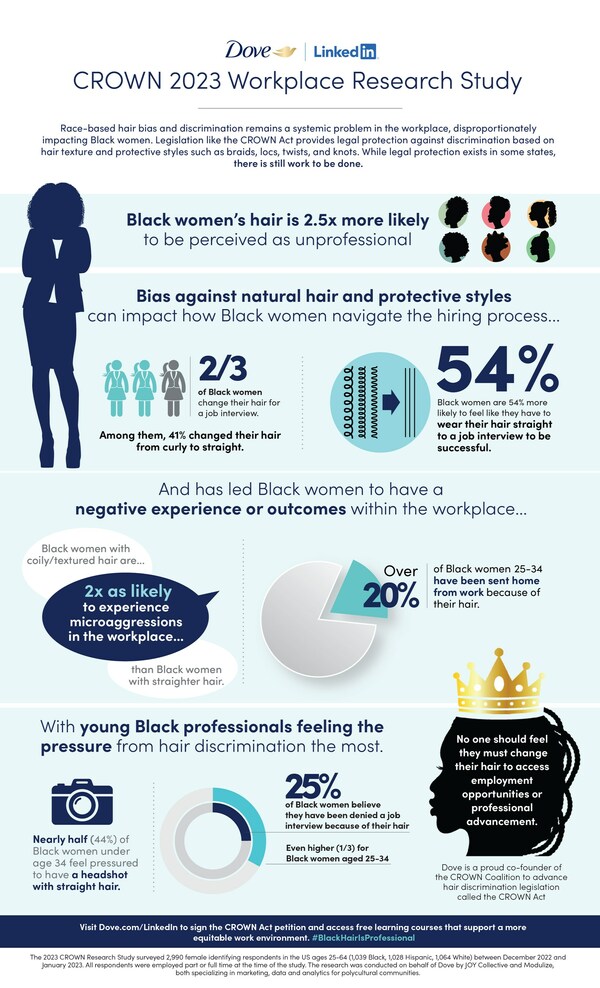
Black women’s hair is finally getting the equitable treatment it deserves.
Thanks to Dove and LinkedIn, this sentiment is moving further to the forefront.
As a part of Dove’s ongoing commitment to help pass The CROWN Act and end race-based hair discrimination nationwide, the organizations joined forces to conduct a wide-reaching study to analyze race-based hair bias and how that affects the professional advancement of Black women.

The NEW CROWN 2023 Workplace Research Study, found that Black women’s hair is 2.5x more likely to be perceived as unprofessional, and details the systemic social and economic impact of hair bias and discrimination against Black women in the workplace. For example, approximately 2/3 of Black women (66%) change their hair for a job interview. Among them, 41% changed their hair from curly to straight. Black women are 54% more likely (or over 1.5x more likely) to feel like they have to wear their hair straight to a job interview to be successful.
“For far too long, Black women and men have been subject to unfair treatment, outright discrimination and a myriad of inequities for simply wearing our natural hair texture and hair styles that are inherent to our cultural identity. This includes being denied employment, being sent home from work, being overlooked for promotions, and a range of micro-aggressions. This may be hard to believe, but it is real, clearly unwarranted, and unacceptable,” says Esi Eggleston Bracey, President & CEO of Unilever Personal Care in North America in a news release. “The goal of the partnership between Dove and LinkedIn is to help put an end to race-based hair discrimination in the workplace. We intend to shine a light on this issue and call upon employers, hiring managers, and professionals to adopt equitable and inclusive practices that create a respectful and open world for natural hair.”
In support of the Crown Act and in effort to spread awareness of the important findings from the study, the organizations launched their #BlackHairIsProfessional campaign, in which portraits of Black women with both protective styles and straight hair is shared widely across social channels. In a clear illustration of the duality of Black hair, the photos open an important conversation about internal biases.
“While talent is equally distributed, opportunity is not. Cultural identifiers, like hair, are not determining factors for someone’s skills or experience, and no one should be denied employment opportunities or professional advancement because of their hair,” says Rosanna Durruthy, Global Vice President of Diversity, Inclusion, and Belonging at LinkedIn in a news release. “As Dove works to change legislation, LinkedIn is working to change workplace behavior by training and educating one million hiring managers and human resources professionals on inclusive and equitable business practices. The mission of ending race-based hair discrimination is critically important to our own desire to make work, work better for everyone.”